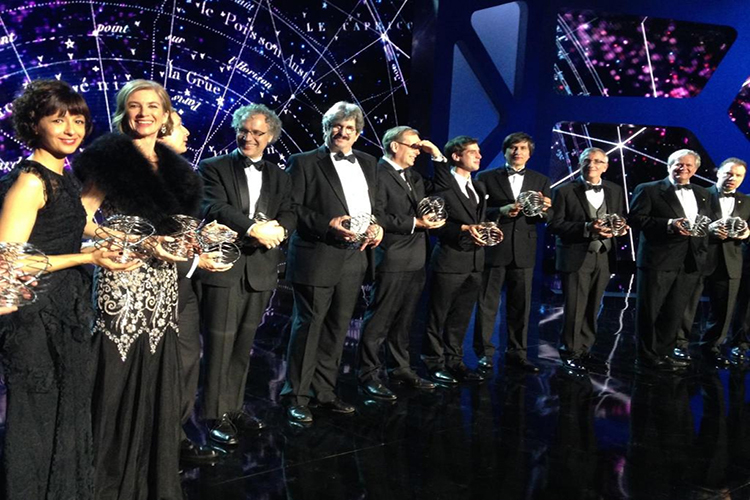Jennifer Doudna, cosmology teams named 2015 Breakthrough Prize winners
Jennifer Doudna was named a winner of the 2015 Breakthrough Prize in Life Sciences at a star-studded gala in Silicon Valley on Nov. 9, while Saul Perlmutter and former Berkeley post-doc Adam Riess accepted the 2015 Breakthrough Prize in Fundamental Physics on behalf of the two teams they led.

November 10, 2014

Jennifer Doudna (center) with colleague Emmanuelle Charpentier (left), newly named recipients of the 2015 Breakthrough Prize in Life Sciences. Cowinner Victor Ambros is on right. (Photo courtesy of Breakthrough Prize)
UC Berkeley structural biologist Jennifer Doudna and two teams of cosmologists led by Nobel Laureates Saul Perlmutter and Adam Riess, a former UC Berkeley post-doc, were named 2015 Breakthrough Prize winners in life sciences and physics, respectively, at a star-studded gala in Silicon Valley Sunday, Nov. 9.
Doudna and the leaders of the Supernova Cosmology Project and High-Z Supernova Search Team accepted the awards — which include $3 million each — from Silicon Valley and Hollywood luminaries, including Benedict Cumberbatch and Cameron Diaz, with songs by Christina Aguilera.
The 2015 Breakthrough Prize winners in all three categories — life sciences, physics and mathematics — will be celebrated Monday, Nov. 10, during a series of three symposia taking place at Stanford University and streamed live to UC Berkeley from 9 a.m. to 5 p.m., with social media conversations through the Twitter hashtag #BreakthroughPrize.
The other recipients of the 2015 Breakthrough Prize in Life Sciences are Doudna’s research colleague Emmanuelle Charpentier of the Helmholtz Center for Infection Research and Umeå University, Alim Louis Benabid of Joseph Fourier University, C. David Allis of The Rockefeller University, Victor Ambros of the University of Massachusetts Medical School and Gary Ruvkun (B.A. ’73) of Massachusetts General Hospital and Harvard Medical School.
Perlmutter, Riess, now with Johns Hopkins University and the Space Telescope Science Institute, and Brian P. Schmidt of Australian National University, accepted the 2015 Breakthrough Prize in Physics for their teams, totaling 51 people in all. The two teams will share the $3 million equally, dividing $1.5 million among team members (see list below). This is only the second time team scientists have shared in the awards bestowed for the discovery. Perlmutter, Riess and Schmidt shared the 2011 Nobel Prize in Physics for their teams’ discoveries.
Recipients of the 2015 Breakthrough Prize in Mathematics, announced in June, are Simon Donaldson of Stony Brook University and Imperial College, London, Maxim Kontsevich of the Institut des Hautes Études Scientifiques, Terence Tao of UCLA and Richard Taylor of the Institute for Advanced Study.
Doudna and Charpentier received the award for their discovery of a revolutionary DNA-editing technique that has upended the world of genetics, finally making possible dreams of gene therapy. The prize announcement lauded them “for harnessing an ancient mechanism of bacterial immunity into a powerful and general technology for editing genomes, with wide-ranging implications across biology and medicine.”

Saul Perlmutter (right) accepts the 2015 Breakthrough Prize in Physics with Brian Schmidt (left) & Adam Riess. (Reuters photo.)
Perlmutter accepted the award on behalf of the Supernova Cosmology Project team, while Riess and Schmidt accepted on behalf of the High-Z Supernova Search Team, which in 1998 simultaneously discovered the accelerating expansion of the universe and dark energy. Riess was a Miller postdoctoral fellow working with astronomy professor Alex Filippenko when the cosmological results were announced. Filippenko was the only person to have been a member of both teams.
Doudna, who holds the Li Ka Shing Chancellor’s Chair in Biomedical and Health Sciences, is a professor of molecular and cell biology and chemistry as well as a Howard Hughes Medical Institute investigator and Lawrence Berkeley National Laboratory scientist. Perlmutter holds the Franklin W. and Karen Weber Dabby Chair in Physics at UC Berkeley and is a faculty scientist at Lawrence Berkeley National Laboratory.
The annual Breakthrough Prizes, which include a trophy and $3 million to each laureate in fundamental physics, life sciences and mathematics, are sponsored by Google co-founder Sergey Brin and his wife, Anne Wojcicki, a founder of the genetics company 23andMe; Alibaba Group founder Jack Ma and his wife, Cathy Zhang; Russian entrepreneur and venture capitalist Yuri Milner and his wife, Julia; and Facebook founder Mark Zuckerberg and his wife, Priscilla Chan. The goal is to celebrate scientists and generate excitement about the pursuit of science as a career.
The ceremony was produced and directed by Emmy Award-winning Don Mischer Productions and will be simulcast in the United States on Discovery Channel and Science Channel on November 15 at 6 PM ET/PT, and televised globally the weekend of November 22 on BBC World News.
The Supernova Cosmology Project Team Breakthrough Prize winners: Greg Aldering, Brian J. Boyle, Patricia G. Castro, Warrick J. Couch, Susana Deustua, Richard S. Ellis, Sebastien Fabbro, Alexei V. Filippenko, Andrew S. Fruchter, Ariel Goobar, Donald E. Groom, Isobel M. Hook, Mike Irwin, Alex G. Kim, Matthew Y. Kim, Robert A. Knop, Julia C. Lee, Chris Lidman, Thomas Matheson, Richard G. McMahon, Richard Muller, Heidi J. M. Newberg, Peter Nugent, Nelson J. Nunes, Reynald Pain, Nino Panagia, Carl R. Pennypacker, Robert Quimby, Pilar Ruiz-Lapuente, Bradley E. Schaefer and Nicholas Walton.
The High-Z Supernova Search Team Breakthrough Prize winners: Peter Challis, Alejandro Clocchiatti, Alan Diercks, Alexei V. Filippenko, Peter M. Garnavich, Ron L. Gilliland, Craig J. Hogan, Saurabh Jha, Robert P. Kirshner, Bruno Leibundgut, Mark M. Phillips, David Reiss, R. Chris Smith, Jason Spyromilio, Christopher Stubbs, Nicholas B. Suntzeff and John Tonry.
NOTE: This article has been changed to reflect the fact that the Breakthrough Prize in Fundamental Physics was awarded to two teams who independently discovered the accelerating expansion of the universe, not solely to the leaders of the teams, as originally reported.
RELATED INFORMATION